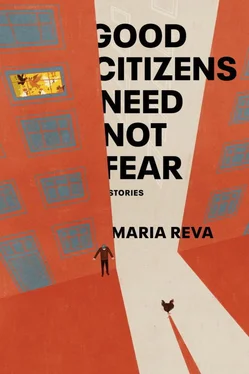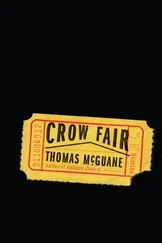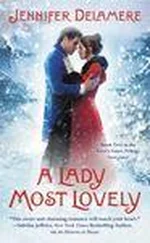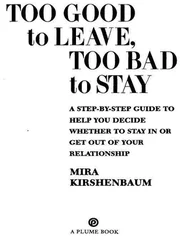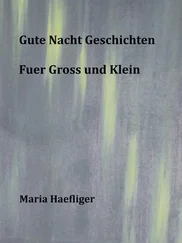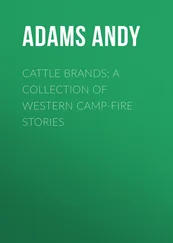Maria Reva - Good Citizens Need Not Fear - Stories
Здесь есть возможность читать онлайн «Maria Reva - Good Citizens Need Not Fear - Stories» весь текст электронной книги совершенно бесплатно (целиком полную версию без сокращений). В некоторых случаях можно слушать аудио, скачать через торрент в формате fb2 и присутствует краткое содержание. Город: New York, Год выпуска: 2020, ISBN: 2020, Издательство: Doubleday, Жанр: Современная проза, humor_satire, на английском языке. Описание произведения, (предисловие) а так же отзывы посетителей доступны на портале библиотеки ЛибКат.
- Название:Good Citizens Need Not Fear: Stories
- Автор:
- Издательство:Doubleday
- Жанр:
- Год:2020
- Город:New York
- ISBN:978-0-38554-529-7
- Рейтинг книги:3 / 5. Голосов: 1
-
Избранное:Добавить в избранное
- Отзывы:
-
Ваша оценка:
- 60
- 1
- 2
- 3
- 4
- 5
Good Citizens Need Not Fear: Stories: краткое содержание, описание и аннотация
Предлагаем к чтению аннотацию, описание, краткое содержание или предисловие (зависит от того, что написал сам автор книги «Good Citizens Need Not Fear: Stories»). Если вы не нашли необходимую информацию о книге — напишите в комментариях, мы постараемся отыскать её.
Good Citizens Need Not Fear: Stories — читать онлайн бесплатно полную книгу (весь текст) целиком
Ниже представлен текст книги, разбитый по страницам. Система сохранения места последней прочитанной страницы, позволяет с удобством читать онлайн бесплатно книгу «Good Citizens Need Not Fear: Stories», без необходимости каждый раз заново искать на чём Вы остановились. Поставьте закладку, и сможете в любой момент перейти на страницу, на которой закончили чтение.
Интервал:
Закладка:
Just then, between two floor tiles, an incisor twinkled in the lamplight.
I fell to my knees, ready almost to kiss this relic. This time I wrapped the tooth in one of the rental kerchiefs from the counter, and stowed it in my double-lined breast pocket.
Another tooth, longer, fanglike, winked at me by the exit. I collected it, stepped outside. One by one the saint’s teeth appeared like stars in a darkening sky.
The third tooth glowed from a crack in the pavement.
The fourth and fifth teeth sat at the rusty foot of a seesaw.
They led me further and further from the tomb. I expected the teeth would retrace the route I’d taken earlier that day from the bazaar, but instead they led me in the opposite direction, toward an unlit park, as though someone had rearranged them as a sinister joke. It was imprudent to be out after sunset, when only thieves and thugs stalked the streets, but I kept on. I tried to imagine myself as a lover, following rose petals to a bed, but couldn’t help feeling like a rodent, lured by crumbs to a trap.
The sixth tooth lounged on a tree root.
The seventh spilled from a half-eaten bag of chips.
The eighth bounced between a stray cat’s paws.
I stopped there. I’d reached the perimeter of the park. Its patchy lawn sloped down to a copse of oaks and a well that had run dry. I needed that last tooth, but was afraid of where it might appear—at the bottom of the well? Under a sleeping pack of dogs? I inhaled the cool night air, tried to compose myself. These were only teeth, after all; I’d been living with a set of my own for forty years. I set off at a trot, down a paved path. When I spotted the ninth tooth roosting in an old flower bed under the oaks, lucent as its siblings, the tightness in my chest broke into laughter. Was this where the teeth had been leading me? To a patch of weeds? Carried by a senseless impulse to catch the tooth before it got away, I lunged forward. My foot caught a notch in the pavement. As I hurled to the ground, my screaming jaws bit into the concrete rim of the flower bed.
I do not know how long I lay in the dark, swallowing blood.
My heart climbed into my head and pounded at my eardrums, seeking escape. My jaws ground at the hinges. I spat out what I hoped was gravel. I clutched the saint’s last tooth. Its claw sank into my palm.
By the time I stumbled back to the tomb, my entire body felt seared with pain. When I turned on the bathroom light, a bloated, scratched face stared at me from the mirror. A criminal’s face. The lips oozed blood. I willed the mouth to open, but now my jaws were stuck shut. This was partly a relief—I did not want to see the damage my tongue had already rooted out. Rotten from a lifetime of avoiding stomatologists, my front teeth had given way easily. Their absence felt vertiginous. My tongue kept back, as though it, too, were in danger of tumbling out, and pressed itself against the molars. A few of these were fractured, their edges jutting sharply.
I opened the saint’s display case, yanked off the linen sheet. Now the saint’s crinkled eyes and thrown-open mouth seemed to be laughing. I knew then where the teeth had been leading me: not just to the flower bed, but also to the notch in the pavement.
I uncapped the tube of glue. Its cloying smell spiked my headache, brought on a wave of nausea. I reached into my breast pocket, unwrapped the kerchief. Inside, I found only a hole. With increasing horror, I discovered that the pocket, too, had a new hole. This time I could not chalk up the loss to bad luck: the teeth had gnawed through both layers of lining. And yet again they were at large, free to wreak havoc upon me.
When a locomotive begins to pull its train, the couplers between the cars tighten with a clack. The clack skips all the way down the train, head to tail, like the cracking of a spine.
When a locomotive begins to pull its train, and a person happens to be crawling under it, they hear the clacks pass over them. A warning: get out, get out, get out. Yet these pilgrims, these men, women, children, had crept on. In their final moments, did they regret what they were doing? Did they still believe that something better waited on the other side?
“Are you in trouble?” Konstantyn Illych asked me the following morning. “I don’t want trouble in my tomb.”
It was fifteen minutes before opening. I tried to ignore the many pairs of eyes trained on me through the glass wall. The swelling of my face and hands had grown overnight. A magenta bruise extended from the corners of my scabbed lips, giving me a clown’s smile. My gums still leaked blood. Konstantyn Illych did not seem to believe a flower bed could do this much damage.
I couldn’t bring myself to tell Konstantyn Illych the truth: yes, I was in trouble, just not the kind of trouble he meant. “I told you. I tripped,” I mumbled. I still could not open my mouth more than a few millimeters.
A freckled teenage boy knocked on one of the glass panes, trying to catch my attention.
“If Zaya comes back and I’m not here, she’ll see your face and run again,” said Konstantyn Illych.
“I’ll run after her.”
“You haven’t seen her run.” He gazed at me as if we were separated by a great gulf; he had someone to love and I didn’t.
“You never told me where Zaya got the saint.” By now I had a hunch, and I dreaded the answer.
Konstantyn Illych scowled, pretending not to understand my muffled speech. I repeated the question, and he shrugged. “Her orphanage.”
“You mean that former monastery?”
He glanced at the pilgrims. “Keep those pretty lips sealed. I hear the Church is trying to reappropriate what it can.”
I began to shiver, and longed to run from the tomb, into the warm sunlight.
Konstantyn Illych slapped my shoulder affectionately. The muscles at the back of my neck locked in spasm. “You can take the day off, but I can’t promise to pay you for it.” He urged me to go see a stomatologist, but we both knew this was impossible. The last public clinic in town had closed, and few could afford the glittering private one.
I stayed in the tomb. We opened on time.
The duty of a guard is to be still, to be present with the world. But over the next several days I could not keep still. Every cell in my body howled. The bruising and swelling began to subside, but the pain did not. Its hooks jerked at my gums, at the exposed nerves of my shattered teeth. I subsisted on potato broth and sour cream, and my stomach wrung itself with hunger.
When I wasn’t thinking of my teeth, I thought of the saint’s. I feared their reappearance, their reassembly. I feared they would punish me, as the noose had punished my ex-colleague. The teeth would gnash me to bits. There were moments when, as if on cue, a pilgrim would turn toward me and I’d catch an opaline glint. In the evenings, I shook out my slippers, felt under my pillow. I even peeked under the saint’s shroud, hoping the teeth had tired of their wanderings and resumed their post. But the saint remained as gap-mouthed as a child.
Each shift stretched longer and longer. My fingers fidgeted with the hole in my pants pocket, worrying it larger. I counted and re-counted the pilgrims. Counting was not part of the job. I did not like the crowd, and quantifying it made it seem even larger, but I couldn’t help myself. I counted the men in sixes. The women in sevens. The children in twos. I imagined them crawling. Flat on the ground.
Thanks to the linen sheet, the relic hunter whispered in my ear, no one would know if they were appealing to a saint or a pile of sandbags. And wasn’t that the power of prayer? The woman brought her taper candle closer to her face, the light from its flame stretching shadows across her features. She kept on: If a saint, no, half a saint, brought this much hope, imagine what would happen if that saint were divided further, into many pieces, displayed in many glass boxes across many churches and homes. Didn’t I want to maximize hope? She offered me a fine price. Would even throw in the sandbags.
Читать дальшеИнтервал:
Закладка:
Похожие книги на «Good Citizens Need Not Fear: Stories»
Представляем Вашему вниманию похожие книги на «Good Citizens Need Not Fear: Stories» списком для выбора. Мы отобрали схожую по названию и смыслу литературу в надежде предоставить читателям больше вариантов отыскать новые, интересные, ещё непрочитанные произведения.
Обсуждение, отзывы о книге «Good Citizens Need Not Fear: Stories» и просто собственные мнения читателей. Оставьте ваши комментарии, напишите, что Вы думаете о произведении, его смысле или главных героях. Укажите что конкретно понравилось, а что нет, и почему Вы так считаете.
